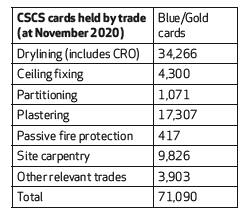FIS Training Lead, George Swann, discusses the sector skills shortage, especially as the number of EU workers may decline this summer. There are solutions though with the FIS BuildBack programme and use of the Career and Qualification Pathways.
I AM not a big fan of the term ‘skills gap’. When people talk about it, do they mean the lack of workers or is it more about the competence of the people we have? In the case of the finishes and interiors sector, there is evidence that the two are directly related.
To be clear, a skills gap forms when employers are unable to fill vacancies with people who have the required skills to do the job. A skills shortage is created when people are working without a valid, verifiable and recognised proof of competence.
The size and structure of our workforce
The number of employees in the finishes and interiors sector is huge – around 200,000. Using data from the 2019 CITB Construction Skills Network this equates to about 9% of the construction workforce.
According to data from FIS, 65.8% of companies in the sector employ European labour and in January 2020, approximately 42% of the workforce was made up of immigrant labour.
To stand still the sector’s annual recruitment rate for the next five years needs to be at least 3,000 per year. This reflects the inevitable churn as people leave, retire or pass away.
Across the UK men retire on average at 67.4 years old and women at 63.6 years old. I’ll be honest, I haven’t seen many 67-year-olds putting up boards, careers in construction tend to be shorter.
The immigration tap is off
The points-based immigration system brings a new challenge. Before 1 January 2020 we had access to a vast labour pool through our membership of the EU and any shortfall in skilled workers had been met by tapping the expanding EU workforce.
Under the points-based system, no trades in construction are deemed ‘shortage occupations’ and many of our trades; drylining, ceiling fixing, partitions installers etc., do not meet the current definition of ‘skilled occupations’. These two issues, combined with the fact around 70% of our workforce are not directly employed, means that the necessary 70 points needed to work in the UK are a pipedream for most trade roles, this tap is well and truly off.
In real terms, this means we need to qualify more people within the UK, but this takes time and the numbers are challenging. If we just look at one trade, drylining, even if all the 25,000 EU workers that have supplemented this occupation remain in the UK through the settlement scheme, we will still be up against it.
To make up the churn of around 1,500 workers we need to double domestic recruitment and training. If we lose just 5% of EU workers, our target for 2021 trebles and so it continues.
None of this takes training time into account, or limited capacity because of continuing COVID constraints. The full extent of the problem is still not clear, there are balancing factors, but there is no doubt there is a problem looming!
Skill levels within the existing workforce
Another challenge that contributes to the skills gap and skills shortage is the competency of the existing workforce. (‘Competency’ is a word that leaps out of Dame Judith Hackitt’s, Building a Safer Future review.) Who is competent to do what and how do we measure it? The best way to identify an individual who is competent for any job is to check that they hold formal, nationally recognised qualifications. Now paper and cards don’t make people competent, but they do help to measure competency and if we look at just one measure; CSCS cards, there is another potentially worrying issue:
 According to the data in the table above, approximately half our workforce in key trades is carrying the right card and, by virtue, have the right qualification for their trade (there are still a lot of people bumping around sites working off a green card). While this isn’t the only measure of competency, you would be on the back foot if you were asked in court: “Did you do all that is reasonable to ensure that the work was carried out by competent people?” and your response was: “Well, half of them had the right card.”
According to the data in the table above, approximately half our workforce in key trades is carrying the right card and, by virtue, have the right qualification for their trade (there are still a lot of people bumping around sites working off a green card). While this isn’t the only measure of competency, you would be on the back foot if you were asked in court: “Did you do all that is reasonable to ensure that the work was carried out by competent people?” and your response was: “Well, half of them had the right card.”
The challenge is mounting, although vocational qualification assessment continued through much of the past 12 months, the pandemic lockdown restricted face-to-face tuition, so individuals who would have been qualified to enter the workplace are still in training and do not yet have the required qualifications. Added to this, although publicity of available support is improving, the training, qualification and funding arena is complex and employers are not always made aware of support available for taking on new entrants as work placements or apprentices.
How to attack the gap and shortage
The EU Settlement Scheme is open to overseas workers for application until June 2021. Employers should ensure that their workers who should apply, do so, or you may not be able to use them beyond 30 June. As we move into July there is more onus to ensure people have a right to work, but for now, it is just a case of checking that they have a valid passport. From June you will need to confirm their status and right to work, this is extra admin, but it protects you, remember the Modern Slavery Act?
As you are upgrading your records, also check what card and qualifications people hold; there are fake certificates being used to acquire Construction Skills Certification Scheme (CSCS) cards, so it is in your interest to check credentials. CSCS has a card checking service and awarding organisations can confirm the authenticity of certificates. This is a good opportunity to engage more effectively with your workforce and recommend training.
Remember that FIS is on hand to help source courses, qualifications and secure funding.
FIS BuildBack programme
The next part of the challenge is more difficult and is driving much FIS activity to reach the 2.7 million registered unemployed workers.
Employers can simply register vacancies at Job Centre Plus offices and to better support access into this potential labour pool, we have secured support to restart the FIS BuildBack programme which introduces, assesses, trains and inducts people into drylining.
FIS is a registered Kickstart Gateway organisation and is working with the Department of Work and Pensions to bring new entrants into the sector. We are always looking for employers to provide work placements, so if you are interested please contact FIS and help us close the sectors skills gap. Contact Marie Flinter, FIS Skills and Training Advisor marieflinter@thefis.org or call 0121 707 0077.
FIS Career and Qualification Pathway documents
There is no silver bullet to solve this issue but there is something that all sector business can do, for example, colleges see many young people disappear after they complete a training course, so if you stay in touch with your local college you may be able to take on an apprentice. Again, FIS is on hand if you need help with this. Contact FIS at info@thefis.org or call 0121 707 0077.
FIS is developing and publishing a Career and Qualification Pathway document for each occupation in the sector. These will provide links to the qualifications available in order to clearly prove competence at each career progression stage. This year, we have already launched the Career and Qualification Pathway documents for ceilings fixers and drylining.
The FIS Skills and Competence strategy is built on the SAKE Framework, measuring competency through a combination of Skills, Attitude, Knowledge and Experience of individuals at each level within the sector.
It maps the qualifications and training that helps people to progress from labourer to site supervisor and beyond. If you are unsure what qualifications are available for finishes and interiors occupations look at the FIS website www.thefis.org/skills-hub We should all reflect on the sector’s weaknesses while recognising the opportunity to improve our training infrastructure. FIS is primed and ready, but employers’ input and support is crucial.
FIND OUT MORE
If you are interested in taking on unemployed or ex-military workers through the BuildBack Scheme, email marieflinter@thefis.org


